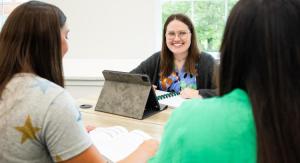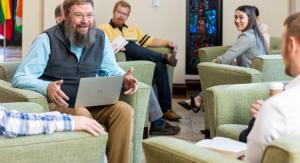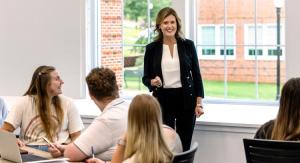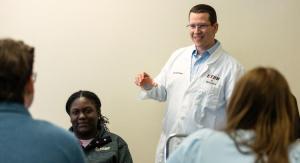Why Choose Counseling?
A career in counseling has a unique reward of working with people struggling with diverse emotional pains and being part of their journey through self-discovery and eventually recovery, with a direct effect on societal well-being. Success in this field necessitates professionals to have a comprehensive knowledge on human behaviors and the contextual issues that affect these behaviors. The School of Natural and Social Sciences at East Texas Baptist University offers a graduate program that prepares students with the requisite knowledge and skills to competently help people struggling with emotional and mental health challenges.
Program Mission
The mission of the Clinical Mental Health Counseling (CMHC) program is to contribute to the University’s mission through equipping students called to the field of counseling with the competence to help individuals and families from diverse cultural and spiritual backgrounds struggling with emotional and psychological issues, using knowledge from Christian faith and counseling research. We emphasize students’ spiritual, personal, and professional identity development through faculty mentoring, along with promoting advocacy, service leadership, and growing the counseling profession.
Program Objective
The CMHC Program’s curriculum allows students to acquire knowledge, skills, and professional disposition. Thus, the Program’s objectives are as follows:
- To equip students with knowledge about the ethical and legal considerations specifically related to the practice of clinical mental health and the strategies for personal and professional self-evaluation and their implications for practice.
- To equip students with knowledge and skills to counsel with cultural competence all individuals, groups, and families; and advocate for equity and social justice in a diverse world.
- To equip students with knowledge and skills to use theories of human development across the lifespan and challenges, including biopsychosocial and environmental factors, to promote culturally diverse clients’ well-being.
- To equip students with knowledge and skills to integrate career development theories and related factors in clinical practice.
- To equip students with knowledge of theoretical approaches to counseling theories and case conceptualizations, including formulating a personal counseling theory and an integrative approach to wellness and prevention as a professional counselor.
- To equip students with knowledge about group development, dynamics, counseling theory, group counseling methods, and group work approaches.
- To equip students with knowledge and skills to select, administer, and interpret assessment tools in a multicultural responsive manner.
- To equip students with knowledge of research and program evaluation methods, including statistical procedures necessary for critiquing and using data to improve counseling outcomes.
- To equip students with knowledge and skills to use diagnostic techniques, criteria, and tools to interview, evaluate, assess, and manage a caseload consisting of a broad range of mental and emotional disorders.
- To foster an inclusive learning community that attracts, enrolls, and retains students from diverse geopolitical backgrounds
- To equip students with the requisite skills for integrating spirituality and religion in counseling clients.
Accreditation
ETBU is accredited by the Southern Association of Colleges and Schools (SACS).
Employment Outlook
If you are interested in learning more about career opportunities in counseling, please consult a representative at the ETBU Handshake Job Portal for students and alumni. Also, the following websites will provide exhaustive information as well:
- U.S. Department of Labor, Occupational Outlook Handbook: http://www.bls.gov/ooh/
- Best Value School: www.bestvalueschools.com
- O* Net Dictionary of occupational title: www.onetonline.org
Counseling Care Center
Forty percent of courses are offered online, while the rest are offered in an online synchronous format.
GRADUATE ADMISSIONS INFORMATION
Cost | Admission Requirements | Transfer of Credit
NEXT STEPS
Request Information | Apply Now
Vital Statistics 2024
ETBU's Clinical Mental Health Program is seeking accreditation from the Council for Accreditation of Counseling and Related Educational Programs (CACREP). In the meantime, the program is thriving as the Lord permits. Last year, three students graduated from the program, and the passing rate for the 2024 National Counselor Examination (NCE) was 100%. An estimated 90% of the program's graduates secured employment in counseling-related positions within 180 days after graduation. The estimated completion time for full-time students is between 2.5 and 3.5 years, and 85% of students enrolled in the program in 2021 completed it within three years.
Program Evaluation
The comprehensive annual evaluation report for the Clinical Mental Health Counseling program can be found by clicking on the following link:
2024 Program Assessment Report
Courses
In addition to the general admissions requirements for all programs, the following items are also required:
- Background Check
- Interview
Course Prerequisites:
- Nine hours in the field of Psychology
- Three of the nine hours must be in abnormal psychology
- Three of the nine hours must be in a counseling-related area
Any deficiency in hours must be satisfied by taking appropriate undergraduate courses. Substitution and/or equivalency decisions for prerequisite courses or transfer of any graduate hours must be approved by the Program Director.
Fall I
COUN 5301- Theories of Counseling
COUN 5304- Professional Orientation in Counseling
COUN 5327- Sociocultural Issues in Counseling
Spring I
COUN 5306- Abnormal Human Behavior
COUN 5312- Lifespan Development
COUN 5330- Professional Issues and Ethics for Practice
Summer I
COUN 6322- Crisis and Trauma Counseling
COUN 6326- Addictions Counseling
Fall II
COUN 5309- Assessment for Counselors
COUN 5315- Psychopathology
COUN 5335- Techniques in Counseling
Spring II
COUN 5305- Group Counseling
COUN 5321- Research and Statistics
COUN 6305- Career Counseling
Summer II
COUN 6324- Advanced Ethics for Professional Practice
Choose one of the electives below:
COUN 5303- Counseling Children and Adolescents (Elective) Or
COUN 6351- Faith Integration in Counseling (Elective)
Fall III
COUN 6301- Marriage and Family Counseling
COUN 6313- Practicum
Spring III
COUN 6350- Internship I
Summer III
COUN 6352- Internship II
Year One Fall
- COUN 5301 Theories of Counseling - This course is designed to provide students with an understanding of the major counseling theories and practices. Several of the major theories of counseling will be examined with an emphasis on four areas: key concepts of the theory, its beliefs about the therapeutic process, the role of the counselor, and how to apply the theory to helping a client change. Each theory will be analyzed for its uniqueness and similarity with the other approaches and applied to case examples.
- COUN 5304 Professional Orientation in Counseling - This course is an introduction to the field of counseling. It includes the history and trends of the counseling profession; the professional roles and identity; and ethical issues that affect the practice of counseling. This course provides opportunities to explore various various issues in counseling such as: career counseling, diversity, school counseling, college counseling, crisis counseling, addictions counseling, rehabilitation counseling and other contemporary issues.
- COUN 5327 Sociocultural Issues in Counseling - This course provides students with an understanding of how diversity and pluralistic trends and treatment strategies are related to such factors as: culture, race, ethnicity, nationality, age, gender, sexual orientation, mental and physical characteristics, education, disability, family values, religious and spiritual values, socioeconomic status, and unique characteristics of individuals, couples, families, and communities.
Year One Spring
- COUN 5312 Lifespan Development - This course provides an advanced overview of current research and theory on life-span human development, and will enhance students' understanding of significant developmental changes that occur over the life span. Emphasis will be placed on standard physical, cognitive, emotional, and social development as well as on issues such as diversity and socialization in relation to perceptions of human development. Professional, clinical, legal, and ethical issues will also be addressed.
- COUN 5330 Professional Issues and Ethics for Practice - This course provides a survey of ethical principles, standards, and legal codes for counselors as defined by the American Counseling Association (ACA), American School Counseling Association (ASCA), and the states of Texas and Louisiana. Students will learn how to apply ethical decision making models to navigate potential ethical dilemmas.
- COUN 5306 Abnormal Human Behavior - This provides an overview of the principles of understanding the dysfunction in human behavior and development. Students will learn how dysfunctional behavior manifests and factors that increase one's vulnerability to abnormal human behavior. This course will also give students the appropriate use of diagnosis during crisis, disaster, or another trauma-causing event. Specific topics include principles of abnormal behavior development, disaster and crisis counseling and models of vulnerability stress.
Year One Summer
- COUN 6322 Crisis and Trauma Counseling- This course will look at the dynamics and treatment of developmental and situational crises, trauma, and grief. Students will be able to apply multiple models of intervention to various problems, such as suicide, sexual assault, domestic violence, substance abuse, school violence, abuse, divorce, grief and loss, and disaster relief. Primary skills of psychological first aid will additionally be taught.
- COUN 6326 Addictions Counseling - This course will provide an in-depth study of the theories and etiology of addictions and addictive behaviors including strategies for assessment and diagnosis, prevention, intervention, and treatment across the lifespan across a variety of settings. Coverage will include but not be limited to gambling, sexual, eating, alcohol, and drug-related addictions.
Year Two Fall
- COUN 5309 Assessment for Counselors - This course provides an overview of various approaches to assessment and procedures for evaluation. Special emphasis is given to counseling decision-making, and treatment planning. Theoretical and applied material will be integrated in order to provide the student with an understanding of the context of assessment and evaluation. Emphasis will be placed on equipping students to understand technical terms in professional journals, test manuals, and test reports.
- COUN 5315 Psychopathology - This course will provide an overview of psychopathology and treatment planning. An interactive, developmental perspective for conceptualizing psychopathology as well as resilience will be employed. In particular, the influence of development, neurobiological mechanisms, and contextual features on the emergence, exacerbation, the medications commonly used to treat these disorders and the alleviation of psychopathology will be discussed. This course will provide an overview of neurobiology and neurophysiology as it relates to psychoactive substances. Students in this course will gain an understanding of how psychotropic drugs work, what effects and side effects they have, and how to work with clients as they receive both medical and counseling services. Prerequisite: COUN5306 with a grade of B" or higher.
- COUN 5335 Techniques in Counseling - This course emphasizes the stages of the helping relationship. Students practice basic attending and communication skills. Counseling skills are introduced through didactic, demonstration, and experiential learning situations. Counseling skills will be integrated with the use of counseling theories. Grade of "B" or higher is required for graduation.
Year Two Spring
- COUN 5305 Group Counseling - A study of group dynamics, process, theoretical applications, techniques and leadership skills in an experiential setting. This course traces the major theoretical orientations in group counseling. Students will learn to apply group approaches to the treatment of mental health problems. Prerequisites: COUN 5301 and COUN 5335
- COUN 6305 Career Counseling - Students will be introduced to career development and the importance of various facets of career counseling. Emphasis is given to developmental considerations and the role of testing, educational and career development program planning and implementation. Technology based career development applications and strategies will be explored.
- COUN 5321 Research and Statistics - A review of the research methods used in counseling. Included are experiences in searching research literature databases, understanding basic statistics, evaluating statistical software, planning research, and communicating research findings. Strategies for effective program evaluation as methods of consultation will also be reviewed.
Year Two Summer
- COUN 6324 Advanced Ethics for Professional Practice - This course explores the range of ethical issues that professionals may encounter within the field of counseling during independent practice. Through lecture, discussions, reading, and role-plays, students will explore such issues as the interrelation between professional ethical codes, ethical decision-making, and records management. Additionally, a survey of applicable rules, laws, and statutes related to professional practice will be undertaken. Prerequisite: COUN5330.
*Choose one elective below:
*COUN 5303 Counseling Children and Adolescents- This course is a didactic and experiential course that prepares graduate students to with the specific needs of children and adolescents. This course will focus on developmental needs, specific therapeutic interventions, and common emotional issues of children and adolescents. Group and individual counseling techniques will be practiced and treatment options will be covered. Prerequisite: COUN5312.
*COUN6351 Faith Integration in Counseling- In this course, students explore personal and professional issues of faith and spirituality as they pertain to clinical competency in professional counseling. Students will have an opportunity to learn about frameworks for faith integration in professional practice. The course provides students with an overview of several common approaches to mental health counseling from a faith perspective that have been well-supported in research.
Year Three Fall
- COUN 6313 Practicum - Counseling supervised field experience. The practicum experience is designed to give counselors in training the opportunity to put into practice the skills and knowledge they are developing throughout the counseling program as they counsel clients for the first time. This practicum requires the student to complete 100 clock hours of supervised practicum, a minimum of 40 hours of which must be direct service. Prerequisites: COUN5301, COUN5304, COUN5308, COUN5309, COUN5315, COUN5321, COUN5327, COUN5330, COUN6305, COUN6322, COUN6326, and COUN5335 with a grade of "B" or higher.
- COUN 6301 Marriage and Family Counseling - This course provides an overview of marital and family counseling from a systems perspective. an overview of the predominant systems theories essential in working with couples and families will be presented. Special emphasis is given to evidence based treatments and the current research on attachment theory and the role of attachment in couple and family distress. Prerequisites: COUN5301 and COUN5335.
Year Three Spring
- COUN 6350 Internship I - Internship I builds upon skills and experiences developed in practicum identifies the strengths and growth areas relative to counseling core competencies, and focuses on expanding the depth and diversity of the student's professional experience as they counsel clients. This internship requires the student to complete 300 clock hours of supervised internship, a minimum of 120 hours of which must be direct service. Prerequisite: COUN6313 with a grade of "B" higher.
Year Three Summer
- COUN6352 Internship II - Internship II is an extension of Internship I and requires the student to complete an additional 300 clock hours of supervised internship, a minimum of 120 hours of which must be direct service. Internship II will build on strengths and improve growth areas identified in Practicum and Internship I as students continue to work with clients. focus will continue to be on providing the best possible client care and professional development. Prerequisite: COUN6350 with a grade of "B" or higher.












